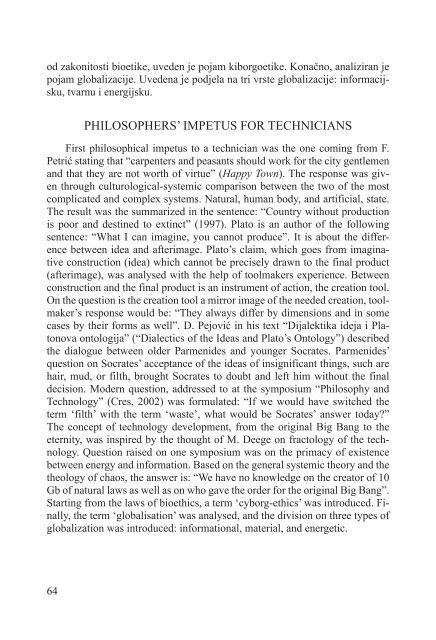Programska knjižica - Hrvatsko filozofsko društvo
Programska knjižica - Hrvatsko filozofsko društvo
Programska knjižica - Hrvatsko filozofsko društvo
You also want an ePaper? Increase the reach of your titles
YUMPU automatically turns print PDFs into web optimized ePapers that Google loves.
od zakonitosti bioetike, uveden je pojam kiborgoetike. Konačno, analiziran je<br />
pojam globalizacije. Uvedena je podjela na tri vrste globalizacije: informacijsku,<br />
tvarnu i energijsku.<br />
PHILOSOPHERS’ IMPETUS FOR TECHNICIANS<br />
First philosophical impetus to a technician was the one coming from F.<br />
Petrić stating that “carpenters and peasants should work for the city gentlemen<br />
and that they are not worth of virtue” (Happy Town). The response was given<br />
through culturological-systemic comparison between the two of the most<br />
complicated and complex systems. Natural, human body, and artificial, state.<br />
The result was the summarized in the sentence: “Country without production<br />
is poor and destined to extinct” (1997). Plato is an author of the following<br />
sentence: “What I can imagine, you cannot produce”. It is about the difference<br />
between idea and afterimage. Plato’s claim, which goes from imaginative<br />
construction (idea) which cannot be precisely drawn to the final product<br />
(afterimage), was analysed with the help of toolmakers experience. Between<br />
construction and the final product is an instrument of action, the creation tool.<br />
On the question is the creation tool a mirror image of the needed creation, toolmaker’s<br />
response would be: “They always differ by dimensions and in some<br />
cases by their forms as well”. D. Pejović in his text “Dijalektika ideja i Platonova<br />
ontologija” (“Dialectics of the Ideas and Plato’s Ontology”) described<br />
the dialogue between older Parmenides and younger Socrates. Parmenides’<br />
question on Socrates’ acceptance of the ideas of insignificant things, such are<br />
hair, mud, or filth, brought Socrates to doubt and left him without the final<br />
decision. Modern question, addressed to at the symposium “Philosophy and<br />
Technology” (Cres, 2002) was formulated: “If we would have switched the<br />
term ‘filth’ with the term ‘waste’, what would be Socrates’ answer today?”<br />
The concept of technology development, from the original Big Bang to the<br />
eternity, was inspired by the thought of M. Deege on fractology of the technology.<br />
Question raised on one symposium was on the primacy of existence<br />
between energy and information. Based on the general systemic theory and the<br />
theology of chaos, the answer is: “We have no knowledge on the creator of 10<br />
Gb of natural laws as well as on who gave the order for the original Big Bang”.<br />
Starting from the laws of bioethics, a term ‘cyborg-ethics’ was introduced. Finally,<br />
the term ‘globalisation’ was analysed, and the division on three types of<br />
globalization was introduced: informational, material, and energetic.<br />
64

















